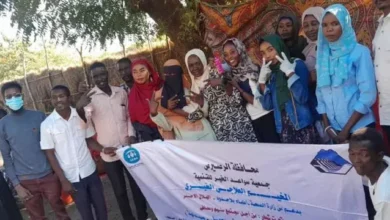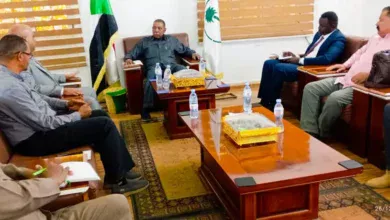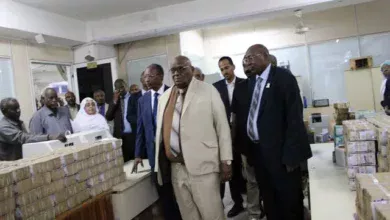A special interview with the Consul General of Sudan in Libya – Approaches – 🎙️ Interview with Dr. Maryam Radwan

The historical relations between Sudan and Libya date back thousands of years and are brilliant relations with an upward trend that transcends all obstacles. It represents a natural and expected path that is based on many foundations and pillars that have been embodied throughout history.
In an exclusive interview conducted by Dr. Maryam Radwan with His Excellency Abdul Rahman Muhammad Rahmatullah, Consul General of the Republic of Sudan in Libya in Benghazi. Moving his vehicle among the Sudanese community with sturdy wheels that will not shake, and strategic thinking according to the models of scientific and practical experience, and with the knowledge that the distance between work and value is eliminated in the space of wisdom.
His Excellency the Consul answers many questions and requests for information, given their importance and responsibility at the same time.
*The number of Sudanese arriving in Libya has increased enormously due to the war in Sudan, since April 15, 2023. What is the mechanism adopted in this matter*?
His Excellency the Consul explained that since the beginning of the rebellion of the dissolved Rapid Support Forces and the beginning of its war against the armed forces, it was clear to us that Libya would be a preferred destination for a large number of displaced persons. That is why, with the beginning of the arrival of the first groups, coordination was carried out with the Libyan authorities to allow the entry and stay of those arriving at the border, without obstacles, which is currently happening. Most of them do not even have passports or identity documents. We therefore testify to the full cooperation and appreciation of the Libyan authorities for their situation, and we thank them for it.
*The Sudanese community in the Eastern Region has held several solidarity rallies to support and sustain the armed forces in their war of dignity against the rebel Rapid Support militia. Under the slogan One Army – One People, how were the bombings inflicted on you?
It is true that the Sudanese communities throughout the eastern region of Libya have organized forces to support and assist the armed forces, which reflects the cohesion and support of the Sudanese for their armed forces, and that they are facing the rebellion of the Rapid Support Forces, which is resolved in its aggression and barbarity against the Sudanese people. This was almost the largest group organized to support the armed forces outside Sudan, and it ended with a major group in the city of Benghazi, during which the Sudanese communities in the eastern region presented a document of alliance and allegiance. To His Excellency Lieutenant General Abdel Fattah Al-Burhan, Chairman of the Transitional Sovereignty Council, Commander-in-Chief of the Armed Forces, through which it affirmed its position alongside the army and the people until the defeat of the rebellion.
*There are no official figures regarding the number of the Sudanese community* *The Sudanese have been present in Libya for years, and there are no documented figures, and now things have become more complicated after the war*? The Consul General explained that, unfortunately, there are no accurate statistics on the number of Sudanese in the eastern region of Libya, for several reasons, the most important of which is the intensity of irregular entry and exit movements. The lack of commitment to regularizing immigration status by obtaining regular residence, for a large number, and the inability of many residents here to obtain passports, for themselves and their families, either due to the lack of services or the lack of interest of many to do so. Because obtaining identity documents is the most important way to identify residents.
*On what basis is data collected on people arriving in Libya, and how is it counted? Are there crisis management committees? What is your reference for counting? Is there an initial survey form for displaced people? Because the displaced people arrived in difficult and complex circumstances, it was necessary to think about ways to shelter them and provide them with livelihoods. The Sudanese communities in the eastern region were therefore mobilized. The committees of these communities transformed themselves into crisis management cells and designed a form that was distributed to the communities to count the arrivals, classify them and provide them with what they needed.
*Displaced persons face a range of needs, including access to food, education, health care and shelter. What measures and assistance have been taken in this regard?*
We sponsor and encourage a number of initiatives within the communities to meet the needs. Which is fully committed to this and works to stabilize these families, based on several axes. In addition to meeting daily emergency needs, we are looking for work for the heads of families to enable them to rely on themselves. The Sudanese from all regions have taken care to accommodate and support their brothers and provide them with what they need.
*Is there a network with the United Nations High Commissioner for Refugees, the Libyan authorities, international organizations and civil society organizations?*
At the Consulate General, I communicated with existing United Nations organizations, such as the International Organization for Migration, the United Nations High Commissioner for Refugees and Libyan voluntary work organizations. We held a number of meetings and meetings with her, and she played a major role in responding to the needs of the displaced persons.
*How did the Sudanese consulate in Benghazi make arrangements in March 2023 to facilitate the voluntary return of Sudanese migrants?*
He explained that the voluntary return flights are continuing, in coordination with the International Organization for Migration, as six flights are planned for the year 2023, and three flights have been operated until March 2023. About 150 Sudanese citizens who voluntarily returned to Sudan have benefited from them, but they were stopped due to the circumstances of what happened and will resume immediately afterwards.
*Are there any concerns about the possibility that a number of displaced Sudanese will fall victim to human smuggling gangs, especially since Kufra is the first stop for these displaced people, and what measures have been taken in this regard?* Yes, there is intense activity by human smuggling gangs, and the Libyan authorities are making great efforts to control it. This is an activity whose victims are of various nationalities wishing to cross the Mediterranean to Europe. There is no way to limit this activity except by controlling the common border between the two countries, and before that by eliminating the reasons that lead to asylum. Unfortunately, many immigrants have lost their lives because of this.
*Libya intends to absorb Sudanese refugee students into its educational institutions (basic, intermediate and secondary). What about higher education*?
Following the meeting of the ambassador in Tripoli with the Minister of Education, it was agreed to accept the children of displaced persons in Libyan schools and universities without being bound by documents. However, the implementation is not yet complete, but on this subject, we have meetings with Libyan officials, and soon the vision will become clear. However, the Sudanese consulate has provided facilities in the admission procedures of schools and universities to complete the equation. . But the decision on free admission has not yet been made.
*Were there any Sudanese killed or missing people recorded in the Derna disaster*? Yes, the Consulate General has a complete and accurate inventory of the victims of the Derna hurricane, from the dead and missing to the affected people and the type of damage they suffered, and it was provided to the Department of Consulates and Community Affairs at the Ministry of Foreign Affairs. We are following up on the committee formed by the Libyan authorities to report and compensate the victims. We have recorded more than one visit to Derna and we have supported the families who were residing after the hurricane in the community house. In public institutions, we have continued to improve their conditions financially. We continue to follow up on the rest in full coordination with the local community. We participated in the condolences presented by the Libyans for the victims of the disaster in the Martouba region, which had a great impact on the souls of Libyans and Libyans. the families of the victims, in addition to facilitating and sponsoring the position of the Sudanese communities, with those affected, alongside the Libyans.
*What measures have been taken to curb illegal migration of Sudanese people through Libya?* The issue of illegal immigration is a thorny and complex issue, and has become one of the issues of global concern. Illegal immigration can only be reduced by eliminating its causes, including poverty and unemployment, in the countries of origin and those resulting from wars and instability. This issue requires cooperation and coordination, on the part of the countries of origin and the countries to which it is addressed.
*The Sudanese school file is extremely important and one of the most difficult files. What are the urgent solutions that have been found in this case?* ? The Sudanese school is one of the files that we have paid great attention to in the past period, we have been able to improve the school environment to meet the requirements of the educational and pedagogical process. We have strengthened the role of the Educational Council and established a computer laboratory, and formed a committee of stakeholders to search for a suitable building for the school. Teachers have also been appointed for the school who meet the conditions of the Ministry of Education. for the conditions of displaced students, which require a comprehensive approach that addresses the educational aspects and methods to address them as well as the psychological and social aspects.
His Excellency the Consul concluded by saying that no action will produce positive results if it is not the means of acquiring useful and renewed knowledge. Commitment is the essence of responsibility and has a moral dimension according to which a person is held responsible for the execution of this obligation.





